| Through its trainings and publications, Ecology Action has catalyzed
projects worldwide.
The projects below had their beginnings through connections with Ecology Action or through people who had connections with us. All of the projects have since put down strong roots and have been the means by which hundreds of thousands of people have learned how to successfully grow their own food. We're proud and honored to call these people our partners!
To see the latest updates on our global network of
GROW BIOINTENSIVE partners, projects, and practitioners
click here to read our "January Letter"
Your donations help us support these projects!

Partners in Mexico, Latin America and the Caribbean
Ecología y Población (ECOPOL)/ El Mezquite: Mexico, Latin America, and Europe
.jpg) Ecología y Población (ECOPOL) was founded by Juan Manuel Martínez in 1992
after he trained with John Jeavons at Ecology Action and received the first Spanish
translation of How to Grow More Vegetables. Juan implemented GB in a rural Ecología y Población (ECOPOL) was founded by Juan Manuel Martínez in 1992
after he trained with John Jeavons at Ecology Action and received the first Spanish
translation of How to Grow More Vegetables. Juan implemented GB in a rural
development project he was conducting for the Mexican Department of Social
Security; he was so inspired by the results that he retired from government work
and embarked on a career focused on spreading GB across Mexico. The work he
started 30 years ago has reached millions of people throughout Latin America
and Europe, and he has travelled to all 42 countries in Mexico, Central America,
the Caribbean, and South America, plus at least five European countries. A
Certified Master-Level GB Teacher, Juan continues to incorporate four key infrastructures
in his GB work: farmers, the university system, NGOs, and Federal and
State governments. He works equally well with campesinos, technicos, academicos and politicos, and has been able to reach an incredible number of people as a
result. His dedication to and enthusiasm for GB and for helping rural populations
is joyous and inspiring. In 2019, ECOPOL merged with Certified Master-Level GB
Teachers Marisol Tenorio and Agustín Medina's NGO El Mesquite (see separate entry, below) to become the
NGO ECOPOL/El Mezquite (ECOPOL/EM) with an online presence in the form of Comunidad Biointensiva (biointensivistas.ning.com) and online Spanish-language Biointensive courses, Aula Virtual Biontensiva (biointensivoenlinea.com). Ecology Action has partnered with ECOPOL since its inception,
and ECOPOL/El Mesquite representatives have come to act as GB ambassadors
across Latin America and Europe. ECOPOL/EM has trained 7.8 million farmers in
the last 21 years with their overall Certified Teacher approach.
Click here to read more.
Juan Manuel was employed by Mexico's Department of Social Security (IMSS) and was able to add the Biointensive method to programs already delivering services to people in rural areas. In the 1990s Juan started providing training in other Latin American countries and after retiring from IMSS in 2001, he has devoted all his time to ECOPOL. Since then he has traveled throughout Mexico, Central and South America, the Caribbean and Europe to make GB presentations, give workshops, and identify trainers who have the potential to become certified.
Through all these efforts, ECOPOL has catalyzed strong GB projects in Mexico, Ecuador, Nicaragua, Peru and beyond. Millions of farmers have been trained (directly and through their large (1000+) farmer-to-farmer training network in Mexico and Latin America) through these efforts. In 2015, Juan started receiving invitations to give workshops in Spain, Italy, Portugal and Slovenia, which he added to his already intensive work schedule. The result: a burgeoning GB community in Europe!
Because of the number of GB trainers now available in Mexico and Latin America, Juan leaves most of the basic training activities to them, and also passed the GB Certification program in Latin America into the hands of Certified Master-Level GB Teachers Marisol Tenorio and Agustín Medina. He has two current goals for himself. The first is to increase the number of certified teachers to help assure that the quality of the Biointensive method will be not only maintained but greatly expanded and headed towards the professional level. As of 2022, he had already exceeded his goal of 100 Certified GB Teachers in the region, and continues to expand this number every year.
Juan's second goal is to seek out and make connections with NGOs, universities and other organizations that have the capacity to use, research, teach and spread the Biointensive method. One of his most recent allies is Friends of the Earth-Spain, which is not only sponsoring GB trainings in Europe, but in Central America too. Juan also maintains an overview of ECOPOL personnel and activities and works to give support where needed and help solve challenges that arise. We are grateful and honored to be working with ECOPOL/El Mezquite, its director, Juan Manuel Martinez Valdez, and its associates Marisol Tenorio and Agustín Medina!
ECOPOL's Spanish Language Comunidad Biointensiva page is here! Haga clic aquí para ver la página!
Agustin Medina and Marisol Tenorio: Mexico
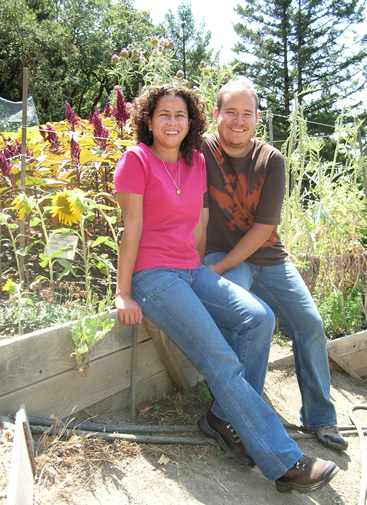
Agustin and Marisol were six-month interns at Ecology Action in 2007. When they returned home they turned El Mezquite—their unsuccessful garden in a rocky, dry area——into a flourishing demonstration/training/research site. They also began working with Juan Manuel Martinez, director of ECOPOL, have since become Certified GB teachers at the Master Level and are currently in charge of the GB Certification program in Latin America.
Since the completion of their EA internship, the two have built up the organic matter levels in El Mezquite's soil at a rapid rate—about 5 times faster than normally occurs in farming.
Click here to read more.
In 2014 John Jeavons awarded Agustin and Marisol each an Advanced-Level Certification, as well as their Master-Level Certification after they spent the summer at The Jeavons Center, taking part in all the teaching and other activities there. The Master Level certification involves not just a great understanding of GROW BIOINTENSIVE but, equally important, an understanding for Soil, Food and People perspectives locally and globally. As Master Teachers they are now able to certify GB teachers at all levels. What this means is that the certification of GB teachers in Latin America is now in the hands of the Latin American people—a long-time goal of Ecology Action and ECOPOL!
Along with all their other work, plus teaching activities and running El Mezquite, Agustin and Marisol both achieved Master's Degrees in 2015—he in GB Compost and Soils and she in GB Seed Propagation. Each has written a peer-reviewed article on their research speciality for publication in an English-language scientific journal, due to be issued when the edits to the Spanish to English translations have been completed.
Find El Mezquite on Facebook at https://es-la.facebook.com/elmezquitebiointensivo
Las Cañadas: Mexico
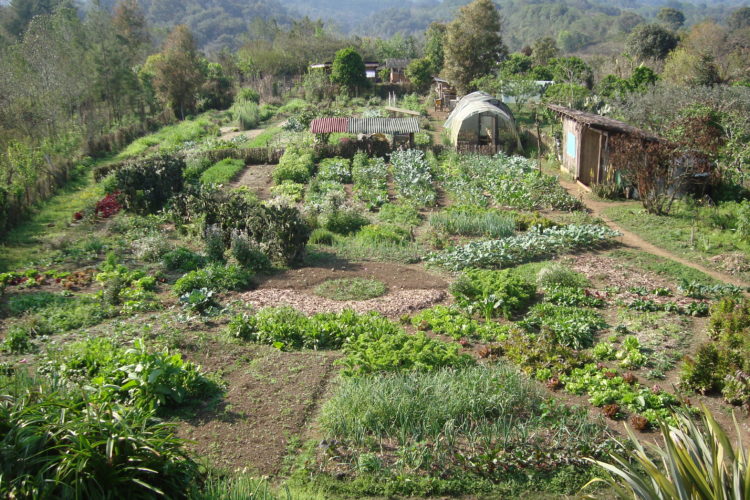 Las Canadas is a unique sustainable living community in Veracruz state that has its roots in both GROW BIOINTENSIVE and Permaculture. Formerly an unproductive cattle ranch, it has been nurtured by it owners—Ricardo Romero and Tania de Alba—into a fertile and productive demonstration and teaching site, as well as a working cooperative. Besides beds for Biointensive food production, an additional 80 beds have been established for seed production—for the first Biointensive organic seed company in Mexico. Las Canadas is a unique sustainable living community in Veracruz state that has its roots in both GROW BIOINTENSIVE and Permaculture. Formerly an unproductive cattle ranch, it has been nurtured by it owners—Ricardo Romero and Tania de Alba—into a fertile and productive demonstration and teaching site, as well as a working cooperative. Besides beds for Biointensive food production, an additional 80 beds have been established for seed production—for the first Biointensive organic seed company in Mexico.
Click here to read more.
Tania de Alba had already been using Biointensive techniques at Las Canadas, and in 1998 she attended a 3-Day Workshop at Ecology Action (EA) in Willits, CA. In 2001 her husband Ricardo Romero was a participant at our 5-Day Teacher Workshop. The two began giving regular Biointensive and Permaculture workshops at Las Canadas. Karla Arroyo, the Las Canadas garden manager, was a six-month intern at EA in 2003. She is also an expert in seed production and added that subject to the community's workshops.
To create the community at Las Canadas, Ricardo combined his knowledge of Permaculture to work with the sloping contour of the land and to implement systems and designs that are environmentally harmonious as well as functional. There are unique, aesthetically pleasing cob structures for housing and hygienically recycling human waste and waste water onsite. Over 50,000 trees have been planted to help restore the cloud forest that makes up Las Canadas' ecosystem. Energy efficiency is also a part of the plan being implemented, and they have been introducing fuel-conserving rocket stoves—by far the most resource-efficient means for heating and cooking.
Take a look at their beautiful GB mini farm in this short film:
Ecology Action, ECOPOL and ADYS, Las Cañadas were all a part of the Latin American Conference 2010: Biointensive Agriculture Facing Climate Change.
A Global Example: Nicaragua
Of all the places in the world where the GROW BIOINTENSIVE method is being used, it is spreading most virally in Mexico and Latin America and—most of all—in Nicaragua. By the end of 2018 there will be over 100 certified trainers at all levels in Mexico, South America, Central America and the Caribbean—with 85 of them in Nicaragua! In 2004, Juan Manuel Martinez, director of ECOPOL, visited the country for the first time. That was when he set himself the goal of helping the country be a reference point for the GB method in all of Central America.
Click here to read more.
At the beginning of 2018 John Jeavons, Director of Ecology Action, and Matt Drewno, Garden Manager at Victory Gardens for Peace, attended a 5-Day GROW BIOINTENSIVE conference in Nicaragua. The event was co-sponsored by ECOPOL, and it is evident that ECOPOL Director Juan Manuel Martinez Valdez' work there has created impressive results. Thousands of people have been or are being trained to use GB, and there are GB gardens all over the country maintained by women, men, and children. John observed that people there take responsibility for themselves and what they are doing, and that culturally, they understand GB and are practicing it "from their hearts".
Nicaragua's National Agrarian University (Universidad Nacional Agraria, UNA)
is in the process of setting up a 3-year GB university course designed to train Biointensive Technical Specialists! Javier Silva, the program's Director, is a professor at the university. GB testing and research are being carried out at the university as well, as within a trainer's demonstration garden. Here's a video about the work being done at the University.
John observed that if GB could be seen globally through the lens of what is being done in Nicaragua, it might save 10 years in the ongoing process to change the world from a depleting agriculture to a living, environmentally sound and productive biologically intensive agriculture
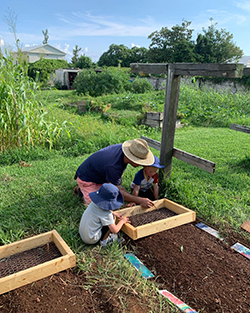 AgraLiving Institute (ALI) AgraLiving Institute (ALI)
AgraLiving Institute (ALI, agraliving.org) located in Smith’s Parish, Bermuda, was established by Chris
Faria in 2006, to improve local food security and provide sustainable GB farming education opportunities
for Bermuda and neighboring islands. The ALI website states: "Bermuda has lost an estimated 87% of its
agricultural land in the last 85 years. Using [GROW BIOINTENSIVE] on the already zoned 735 acres of arable land
we would be able to grow enough food for half the population."
Click here to read more.
The ALI mini-farm has been growing for two seasons now, demonstrating that GB works well in
sandy tropical soils, growing grains, Irish and sweet potatoes, carrots, lettuce, garlic, onions, roselle,
amaranth, tomatoes, basil, celosia, zinnias, safflower, flour corn, pigeon peas, and cucumbers.
ALI hosts workshops on topics including garden planning, sustainable mini-farming, and medicinal plants, as well as a popular
Children's Gardening Club (an after-school program for 3-to-10-year-olds), and a sustainable farming series for a middle-school mentoring program. In partnership with the Bermuda Education Network, ALI hosted 224
third graders in a program introducing food security, growing healthy plants, and identifying food
crops. They are expanding this program for fifth graders. ALI has been approached by the Westgate
Correctional Facility to run a gardening program at the prison, starting with 5-8 inmates
growing a small garden, then scaling up to grow healthy whole food for their kitchen.
AgraLiving Institute offers a Garden Support Consultation Service , including 1-hour site visit, a
6-month Biointensive garden plan, providing customers advice on any garden-related questions during
the visit, and offering soil testing services from collecting the samples to sourcing the amendments
recommended by Grow Your Soil (growyoursoil.org).
Director Chris Feria is working to complete
the necessary requirements for
Intermediate GB Teachers Certification;
in pursuit of this goal, Director Feria and an
ALI intern participated in EA's online 2022
8-Month Internship program.
Partners in Africa
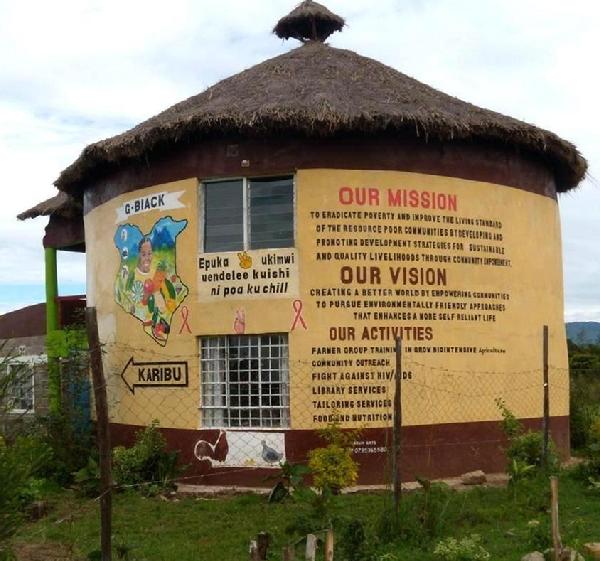 Grow Biointensive Agriculture Centre of Kenya Grow Biointensive Agriculture Centre of Kenya
(G-BIACK): Kenya
In 2007 Samuel and Peris Nderitu—both graduates of Manor House Agricultural Centre in Kenya—had to flee from their home in western Kenya during the tribal conflicts. They moved to Thika, near Nairobi in eastern Kenya and a year later started G-BIACK. In the 10 years since, this dynamic couple has trained over 19,000 smallholder farmers, as well as homeless children, HIV-impacted widows and orphans, under-served young women, at-risk young men, and international interns. They recognize the importance of teaching women farmers, who make up 75-80% of all growers and are often marginalized, with only small parcels of land to feed their families.
Click here to read more.
Samuel and Peris met when they were both students at Manor House Agricultural Centre in Kenya and married in 1994. Ever since, while raising their biological son and daughter and their adopted son, they have been partners in GROW BIOINTENSIVE outreach projects. Samuel met John Jeavons at the GB conference that was held at Manor House in 2007, and stated he wanted to be "the John Jeavons of Africa". All he and Peris have accomplished since that day proves Samuel wasn't just voicing and idle thought. Their work has been prolific.
Three basic forms of training are offered by G-BIACK: training of farmers in their own communities and at the Centre, the training of individual interns to teach others to be trainers, and a variety of programs at its Women's Centre to supplement GROW BIOINTENSIVE agricultural training—such as nutrition, family health, and income generation, which are all important factors to empower women and families in the region. Interns have come to G-BIACK from across Kenya as well as Nigeria, Afghanistan, Mexico, the U.S., Malawi, Rwanda, South Sudan and Tanzania.
In each community where trainings are given, two Community Resource Persons (CRPs) are
selected by the community to continue the project when G-BIACK transitions out. The CRPs are given extra training by G-BIACK in GB skills and leadership, and in this way the original training is reinforced and internalized. After five years of training local young women in six-month GB, nutrition and job skills programs, G-BIACK constructed a residential unit so that girls from all over Kenya (aged 15-25) could learn those skills in a one-year program. In 2017 seventy young women took part in the program.
G-BIACK's satellite farm pilot program, developed in 2016, is a success. In 2021 we were pleased to report that there
were 37 Satellite Centers in operation, and in 2022, despite all the challenges facing Kenya including an historic ongoing
drought and the pandemic which continues to propagate in waves across the country, excellent progress was made, with the result of 43 Satellite GB Centers now operating across Kenya! The new additions are in multiple regions, with a high
concentration in Machakos and Kiambu Counties. The Satellite Center farmers have started to teach their neighbors to
use GB. The main purpose of the satellite farms is to help G-BIACK to scale up their outreach program so that the method
reaches as many farmers as possible.
G-BIACK has received impressive recognition for its work, such as the "Best NGO of the Year" in the district awarded by the United Nations' Food and Agriculture Organization (UN-FAO) in 2010, the "Food Sovereignty Prize" Honorable Mention awarded by The Community Food Security Coalition CFSC of USA in 2011, and nomination by the Katerva Awards for "Best Organization of the Year" in 2012. Several NGOs have invited and sponsored Samuel and Peris for workshops in Germany, Uganda, Tanzania, the U.S. and Scotland. Samuel has been elected by his peers to be the first president of the Kenya chapter of the newly formed GEN-Africa organization, which has emerged with the support of GEN-Europe and promotes social resilience environmental protection, and restoration of nature through development of "ecovillages" and networks.
For a closer look at the work being done here, watch this short (12-minute) film Grow, about G-BIACK and the biointensive farming movement!
For more information go to http://www.g-biack.org/
Garden of Hope
(Kenya)
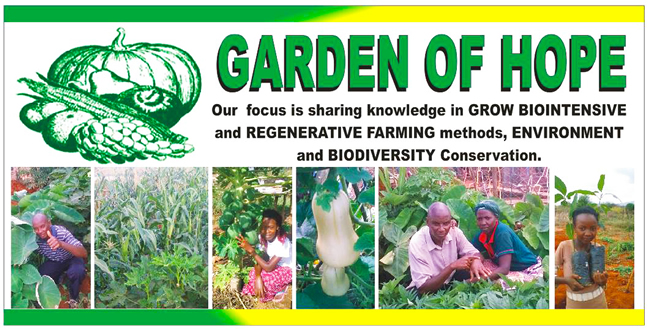
Jonnes Elijah Mlegwah, known as Mlesh, was an 8-Month Intern at The Jeavons Center Mini-Farm in 2016. When he returned homehe established the grassroots, nonprofit
CBO Garden of Hope (GOH) in Taita-Taveta County, Kenya. With
over 40 double-dug beds planted in the GB 60:30:10 crop ratio, and
site-grown compost enriching the soil, GOH is now in its 6th season,
which is a huge accomplishment under the difficult circumstances of the 2020-2022 COVID pandemic.
Click here to read more.
Mlesh's work takes place in a country hard-hit by COVID-19; in 2022, inflation impacted the
economy, causing food prices to double in June; and Kenya continues to endure its worst drought in 40 years, according to the government
and UN. More than four million people in the country are "food insecure," and 3.3
million can't get enough water to drink. Taita-Taveta is one of the
23 Kenyan counties reclassified
as “Arid and Semi-Arid” as the
drought continues, and Garden
of Hope has been impacted, with
some newer additions to the
main garden failing due to lack of
water and depredation by zebras,
baboons, and elephants(!) foraging
in the parched environment.
Nevertheless, work continues in the
mini-farm (including establishing
sunken "fertility trench" beds to increase soil organic matter and encourage water conservation),
experimenting with fast-maturing sweet potatoes (50% shorter growing time means less water used per
harvest), and creating a “bio-repellent” out of hot peppers to deter large pests. The GOH Tree Nursery
Project, started in 2020, continues to grow, providing seedlings for the community to plant, with papaw,
cluster apples, guava, purple plum, and passion fruit saplings established in water-efficient compost-filled
holes at GOH for the community to enjoy.
Other work includes maintaining a growing list of partnerships and networks (including building GB
demonstration gardens and teaching soil-growing and water-harvesting techniques with the Ghazi
Community Investment Task Force, and Hand in Hand Eastern Africa); hosting interns from our partners
G-BIACK and Good Nutrition for Everyone; conducting meetings, workshops, and tours; participating in virtual meetings, trainings and conferences; coordinating Mbulia
Farmer Field School activities including 1-day tour/workshops); providing SIFA FM radio
programming; participating in a Village Savings and Loan Program providing microloans to community
members; and participating in the Ghazi Sublocation Community
Investment Project (funded by Agricultural Climate Resilience Enhancement Initiative (ACREI adaptationfund.
org/project/agricultural-climate-resilience-enhancement-initiative-acrei-ethiopia-kenya-uganda/).
The project has identified land on the river near GOH where a weir will be built to provide irrigation water
for smallholder farmers and allow for much-anticipated gardening programs at primary and secondary
schools.
Sustainable Agroecological Development Action (SADA)
(Kenya)
.jpg) Fredrick Onyango (pictured here with his wife Hellen) was 2019 8-Month Intern and former G-BIACK staff member, and received an award from the Kent Whealy Scholarship Fund for
Ecology Action. Upon completion of his internship, he quickly established his NGO Sustainable Agroecological Development Action (SADA, http://sadacentrekenya.net/) in in Siaya County, Kenya. SADA continues to impressively expand
the number of farmers trained (regularly reaching 300 people a month with GB programs) and the
number of funding sources to support
their continued work, including
crop sales. Ecology Action continues to assist this program with monthly financial support. Fredrick Onyango (pictured here with his wife Hellen) was 2019 8-Month Intern and former G-BIACK staff member, and received an award from the Kent Whealy Scholarship Fund for
Ecology Action. Upon completion of his internship, he quickly established his NGO Sustainable Agroecological Development Action (SADA, http://sadacentrekenya.net/) in in Siaya County, Kenya. SADA continues to impressively expand
the number of farmers trained (regularly reaching 300 people a month with GB programs) and the
number of funding sources to support
their continued work, including
crop sales. Ecology Action continues to assist this program with monthly financial support.
Click here to read more.
Fredrick Onyango, SADA Director says: "Food security begins with sustainability of soil fertility. We established SADA Centre to restore the hope of farmers that despite the extent of soil degradation we can get our soil fertility back. The SADA staff trains farmers on compost making, management, and cured compost application. Some other major components are soil moisture conservation, crop diversity and rotation, cover cropping, minimal tillage (double digging) and use of open pollinated seeds."
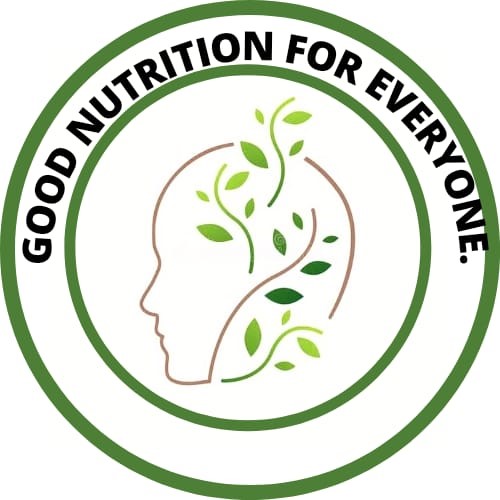 Good Nutrition for Everyone (GNE) Good Nutrition for Everyone (GNE)
(Kenya)
After completing his 2008 Internship with Ecology Action, Director Boaz Odour established his project, Good Nutrition for Everyone (formerly Organic for Orphans (O4O)) in Kenya, where he teaches Biointensive farming to struggling African farmers, students, prisoners, and refugees.
Click here to read more.
Boaz does his extraordinary work with two staff
members, and with financial assistance from Ecology Action. They average
four workshops a month with at least fifty participants per workshop (in 2022 they were averaging 350 participants per event!),
focusing on northern and remote Turkana (the largest county in Kenya), as well as Kakamega county in the
summer. Many of these events are associated with
area churches and prisons. Boaz points out that since church pastors often visit and pray with the sick,
Nutrition for Everyone is focused on training them in the importance of a good diet, growing organic food,
and basic natural medicine, so they can protect their own health, and share healing information with their
parishioners. Many Kenyan prisoners are charged with crimes but not convicted and most cannot afford
the high fees for lawyers and a trial. Even actual criminals, Boaz points out, need to be rehabilitated and
taught useful skills so that when they get out of prison, they can better themselves and provide for their
families, and so GNE teaches them to grow food using GROW BIOINTENSIVE.
Immediate plans (if sufficient funding is secured) include holding three 5-day workshops per month (at different
venues, where demonstration gardens could be established during
the workshops), five-day workshops to establish GB demonstration
gardens at prisons, and holding a pastor’s conference to train a large
group of church leaders. The long-term goal is to build a sustainable
orphanage and full GROW BIOINTENSIVE demonstration center, with
gardens and buildings for housing orphans and training them in life
skills as well as gardening, much like the program at G-BIACK.
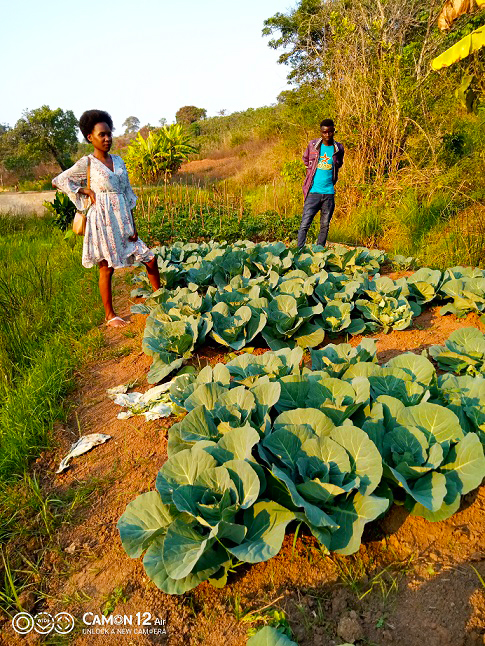 GROW BIOINTENSIVE Malawi GROW BIOINTENSIVE Malawi
Partners Ephraim and Themba’s project GROW BIOINTENSIVE Malawi (GBM) continues to spread GB
in one of the poorest countries in the world. Eighty percent of Malawi’s population relies exclusively
on subsistence farming using only rain for irrigation, and malnutrition is endemic, particularly among
children. GBM’s demonstration mini-farm “Mbowe” is in Mzuzu, the
main city in Malawi’s Northern Region, which provides a service
hub for the remote north. Since 2014, GMB has implemented
their Empowering Rural Poor in Malawi Project in Mzimba, the
largest district in Malawi, with the goals of increasing long-term
household nutrition, food security, and income; strengthening
local development structures and programs to improve livelihoods among resource poor families; and improving collective sustainable agriculture skills.
Click here to read more.
GBM directs their own training programs and meets with other
NGOs to help with programs such as seed banks, as well as finding
new participants and locations for workshops. Ephraim and Themba
hold monthly workshops (regularly attracting 30-50 participants) as
well as shorter classes at Mbowe, do follow-up visits to farms ensure
quality control, and travel to give workshops and classes, which
reliably draw many dozens of participants (two assistants care for
the garden when they travel). The training varies from 1-day workshops on topics like nutrition or seed
saving, to 2-week intensive sessions covering the whole GROW BIOINTENSIVE method. Their program
has consistently reached up to two thousand participants per year.
At Mzuzu, water is hand-carried from the pond to the garden, but there are plans to purchase a solar-powered
water pump. In 2022, generous support from the Buddhist Global Relief Foundation (the project's
major funder through Ecology Action) meant Ephraim was able to buy a motorbike, which will enable him
to travel further to hold workshops. The tree nurseries established in 2021 have expanded (a vital resource,
as trees across Malawi are converted into cooking charcoal, which spurs desertification of the soil), and
their important work continues.
Partners in the US and Canada
Victory Gardens for Peace at Stanford Inn-By-the-Sea
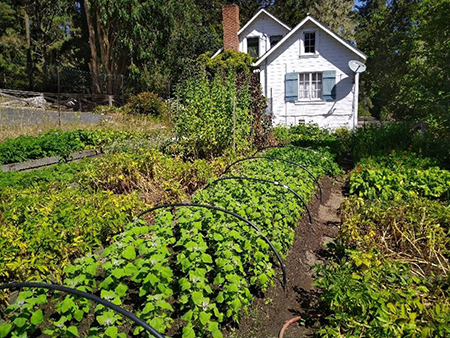
Ecology Action's Victory Gardens for Peace Mini-Farm is located on the Mendocino coast, on the property of Stanford Inn-By-the-Sea. In 2010 the Stanfords opened their land for Ecology Action to establish a GB Mini-Farm. We call the site Victory Gardens for Peace (VGfP) in honor of the victory gardens grown by average citizens during World War II. The site demonstrates how GB works in a maritime-influenced climate, with a focus on salt-tolerant species.
Click here to read more.
In 2010 Stanford Inn-by-the-Sea made their land available to Ecology Action for a new GB Mini-Farm—at that time called the GreenBelt. The Mini-Farm was renamed Victory Gardens for Peace (VGfP) by Matt Drewno, the Mini-Farm's Manager. Matt, who won his advanced-level GB Teacher certification in 2018, chose that name after reading about the Victory Gardens established by individuals during World War II, which produced 40% of the nation's produce! He hopes the name will inspire people across the US – and beyond—to grow gardens to spread peace rather than war.
Since 2015, the VGFP Initiative has developed several key programs, including a popular 9-Part GB course series, the Garden Friendly Community Resolution (GFCR), the Victory Gardens for Peace Seed Bank (which gathers seeds from gardeners within a 15-mile radius and gives back free seeds to the community. Currently, the seed bank holds over 1000 accessions), and the GardenCorps Program. The bulk of Ecology Action's onsite classes, workshops, and internships are currently hosted at this easily accessible site, and we believe this project provides a model for how commercial/non-profit partnerships can work together to benefit a whole community. Ecology Action and VGFP would like to thank The Stanford Inn Eco-Lodge for continuing to help our work grow by contributing the land and water for the VGFP 70-bed Mini-Farm.
Multinational Exchange for Sustainable Agriculture (MESA)
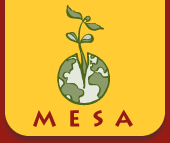
Since 1997, MESA has been connecting farmers and sustainable food advocates around the world for participatory training and cross-cultural exchanges to strengthen local, resilient food systems worldwide. They have helped place many interns with Ecology Action since then.
Click here to read more.
MESA's U.S. agricultural program designation permits it to sponsor trainees (Stewards) for up to 12 months on a J-1 training visa to come to the US. MESA also facilitates international training and exchange opportunities with its alumni network for farmers and agrarians.
MESA's training is a two-way exchange to spur innovation and preserve traditional techniques worldwide and advance a farmer-led grassroots movement to transform the global food system. Training programs focus on ecological production practices, processing, direct marketing, community organizing and education, and organic crop research and breeding.
To enable recruitment of Stewards for US training, MESA establishes global partnerships with NGOs, university programs, and other organizations that are well regarded in the field of sustainable agriculture and cultural exchange.
For more information, go to http://www.mesaprogram.org/
Kilili Self-Help Project: Kenya
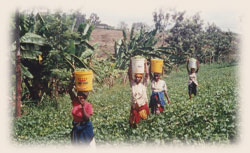
Sandra Mardigian, a colleague of Ecology Action who had spent many years in Kenya, started Kilili Self Help Project in 1985 as a Kenyan community assistance fund. When word reached her that Manor House Agricultural Centre (MHAC), a Biointensive agriculture school, had just been started in western Kenya, she chose to use Kilili funding to support the Centre's graduates who were training farmers in their communities. Sandra did so for many years.
With experience over the years, Sandra's vision evolved and an idea took shape for a grassroots GROW BIOINTENSIVE education center where farmers could come for training and the center's staff could also do outreach to train farmers in their communities. In 2008, the concept was manifested with the opening of the Grow Biointensive Agriculture Center of Kenya (G-BIACK). Since then, Kilili's entire focus and funding has been directed to G-BIACK.
Click here to read more.
Kilili Self Help Project is located at 260 Marion Ave. Mill Valley CA 94941 USA
e: smardigian.kilili.self.help@gmail.com
All of Kilili's focus and funding is now directed to G-BIACK.
The Kootenay Society for Sustainable Living (Canada)
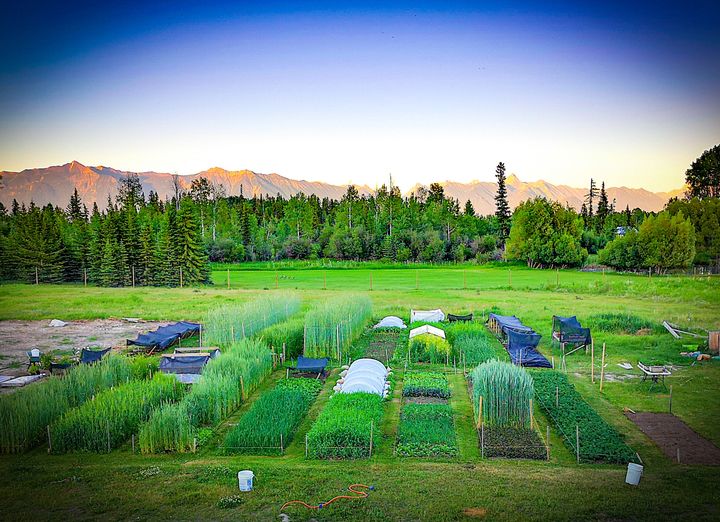
Sharon Coombs and James Christie-Fougere, co-directors of The Kootenay Society for Sustainable Living (growsustainability.org), near Kimberley, British Columbia, were 2016 EA interns and graduated
from our program with the goal of immediately starting their own GB research and demonstration center.
After procuring land, the couple (who were also new parents) transformed the property into a garden of
abundance, growing compost crops to feed their array of double-dug beds, and focusing on short-season
crops which grow successfully and yield well in their extremely cold and short growing season.
Click here to read more.
Their GB mini-farm "Future Heirlooms" grows abundant leeks, garlic, potatoes, beets and carrots, legumes
in its 70 growing beds, but its primary focus is grains. James and Sharon are conducting comprehensive
variety trials of different cereal crops and keeping extensive planting and harvesting notes using
the same standardized cultivation and data collection methods all international partners in Ecology
Action’s network use.
They are assisting in the Soil Sustainability Research Project (SSRP), to determine the smallest
amount of land needed to grow a complete diet for one person for a year. Future Heirlooms mini-farm is
located at a high latitude with a very short growing season, which is useful for research, as the "smallest
area" needed to grow a full diet in their conditions may vary from the area used by SSRP mini-farms in
temperate climates.
Future Heirlooms offers a variety of programs and services to their community and region, including
The Backyard Mini-Farming Initiative (providing garden design consultation, professional laboratory
soil testing (through John Beeby’s Grow Your Soil), and training and assistance turning participants’
backyards into productive GB mini-farms, including educating participants to use GB). The Future Heirlooms Seed Bank was established in 2022 (online at growsustainability.org/seed-bank)
accepting accessions by donation and offering seeds internationally, including Barley, Beets, Carrots,
Chard, Einkorn, Onion, Parsnip, Quinoa, Rye, Salsify, Sunflower, Triticale, and Wheat, selected from the
strongest, fastest, highest yielding plants at Future Heirlooms, making them cold and frost tolerant,
adapted to extreme day/night temperature shifts, and acclimatized to the dry climate, dry sandy soil, and
high pH at Future Heirlooms.
Biointensive for Russia
 Since 1990 Ecology Action's colleague Carol Vesecky has been facilitating GROW BIOINTENSIVE workshops in Russia, Siberia and Uzbekistan, as well as the translation of EA publications into Russian. She started Biointensive for Russia (BfR) in 1993 after the Russian translation of EA's flagship publication How to Grow More Vegetables, in order to get the book to as many Russians as possible. Originally, Carol identified Eurasians to come for training at EA. As a result, in the most recent count, 45 teachers in Russia were including GB in their school or university classes. Since 1990 Ecology Action's colleague Carol Vesecky has been facilitating GROW BIOINTENSIVE workshops in Russia, Siberia and Uzbekistan, as well as the translation of EA publications into Russian. She started Biointensive for Russia (BfR) in 1993 after the Russian translation of EA's flagship publication How to Grow More Vegetables, in order to get the book to as many Russians as possible. Originally, Carol identified Eurasians to come for training at EA. As a result, in the most recent count, 45 teachers in Russia were including GB in their school or university classes.
Click here to read more.
Following the 2016 print-on-demand publication of the third edition of the Russian translation of How to Grow More Vegetables, Dr. Ludmila Zhirina of the NGO Viola taught workshops in St Petersburg and its surrounding region. Irina Skiba, one of the workshop participants, worked with Ludmila to plan a teaching tour for May 2017 into the northwest regions of Russia (Yaroslavl, Vologda and Arkhangelsk provinces). Ludmila accomplished an extraordinary amount in only nine days, traveling nearly 2,000 miles, holding more than 20 meetings and seminars in rural schools and on farms, and distributing the Russian translation to teachers. Ludmila also collaborated in collecting heirloom seed varieties, some of which were planted in the summer in Bryansk. She was hosted by school principals, farmers, orchardists and bee-keepers. Ludmila said she thought the Biointensive method would work well in the north, with its cold climate, short summers, and wet soil.
BfR also funded research projects for many years in areas contaminated by the Chernobyl nuclear accident. These tests were initially carried out by the Russian NGO Viola, and later by the Russian Grassroots Alliance PERESVET. Results of these experiments show that double-digging and the use of compost can reduce the radionuclide content of the soil by about 30%.
Visit Biointensive for Russia’s websites for more information:
Steve Moore – USA
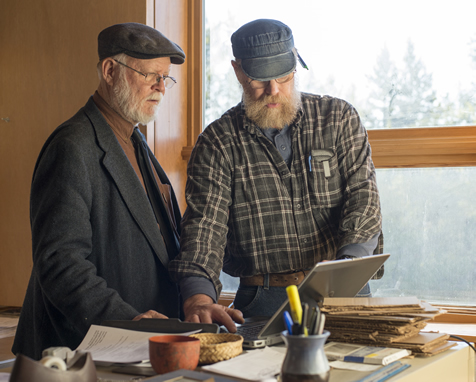 Steve Moore and his family have farmed organically for over four decades, with a diversified farm background in small fruits, vegetables, bees, dairy cows, draft horses and other livestock. He has used Biointensive techniques since 1995 in the market production of fruits and vegetables. Steve has been a pioneer in solar greenhouse and high tunnel production for over 25 years. His background also includes positions at 4 colleges/ universities as a faculty member, researcher and program developer and manager. He has served on several state and non-profit boards. He provides consultations, presentations and workshops to farmers and for such diverse groups as USAID, Mercy Corps, Peace Corps and several Universities. He is design-certified in Permaculture and is an Intermediate-Level GROW BIOINTENSIVE teacher. He was part of the National Cooperative Extension team to develop E-extension educational information on sustainable energy production and utilization in agriculture. He served multiple terms as an associate editor of the peer review journal, Renewable Agriculture and Food Systems, and is a former Vice President and Associate Director for Ecology Action. Steve Moore and his family have farmed organically for over four decades, with a diversified farm background in small fruits, vegetables, bees, dairy cows, draft horses and other livestock. He has used Biointensive techniques since 1995 in the market production of fruits and vegetables. Steve has been a pioneer in solar greenhouse and high tunnel production for over 25 years. His background also includes positions at 4 colleges/ universities as a faculty member, researcher and program developer and manager. He has served on several state and non-profit boards. He provides consultations, presentations and workshops to farmers and for such diverse groups as USAID, Mercy Corps, Peace Corps and several Universities. He is design-certified in Permaculture and is an Intermediate-Level GROW BIOINTENSIVE teacher. He was part of the National Cooperative Extension team to develop E-extension educational information on sustainable energy production and utilization in agriculture. He served multiple terms as an associate editor of the peer review journal, Renewable Agriculture and Food Systems, and is a former Vice President and Associate Director for Ecology Action.
Click here to read more.

Steve is currently teaching AgroEcology within the Environmental Studies Department at Elon University, Elon, NC, where he created a Bachelor's Degree program in Sustainable Food Systems based on GB techniques, and has established a cooperative agreement between the Peace Corps and Elon, with a resulting Peace Corps Prep Certification.
Previously he was the Small Farm Unit Manager and Agriculture Energy Specialist at the Center for Environmental Farming Systems, North Carolina State University. He was the past Director of the Center for Sustainable Living at Wilson College, Chambersburg, PA, and founder of the Robyn Van En Center for CSA Resources. He is co-founder (with wife, Carol) of Harmony Essentials, a company dedicated to the vision and practices of a sustaining food system. Steve was appointed to the Pennsylvania Sustainable Agriculture Advisory Board, served two terms on the board of directors for PASA (Pennsylvania Association for Sustainable Agriculture).
Cindy Connor – USA
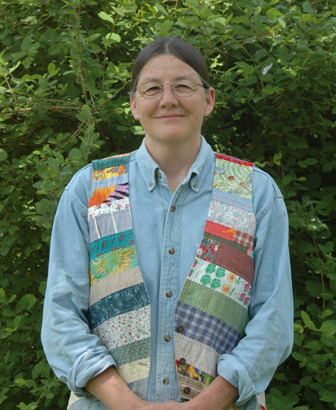
Cindy, a former market gardener, turned to Ecology Action to learn about sustainable growing, and became certified at the intermediate level in 2006. She Since then she has helped establish the sustainable agriculture program at J. Sargeant Reynolds Community College in Goochland,VA, has given 3-Day workshops in Virginia and North Carolina and created GB-based DVDs -- Cover Crops and Compost Crops IN Your Garden (2008) and Develop a Sustainable Vegetable Garden Plan (2010). She has written two articles for Mother Earth News magazine—"A Plan for Food Self-Sufficiency" (2012) and "Best Staple Crops for Building Food Self-Sufficiency" (2013)—and is a frequent speaker at the Mother Earth News Fairs. Her books Grow a Sustainable Diet: Planning and Growing to Feed Ourselves and the Earth (2014), andSeed Libraries and Other Means of Keeping Seeds in the Hands of the People (2015) were both published by New Society.
Cindy enjoys her relationship with Ecology Action and credits her study of GROW BIOINTENSIVE with providing her a practical base on which to build her work. She sent us an update of her activities in 2018, which you can read below.
Click here to read more.
Cindy wrote the following in 2018, in an update she sent to Ecology Action:
I am deeply involved with all the aspects of growing one's own cotton and linen clothes. I still am strongly into growing food and cover crops in my garden and have added cotton and flax. In 2011 I learned to spin the cotton I grew and completed my homegrown, handspun, naturally colored, cotton vest in 2015. During that time, I also wrote "Grow a Sustainable Diet" and "Seed Libraries". Once the vest was done, and I was free of book writing, I wanted to encourage and teach others how to grow their own clothes and realized that not everyone lives in a climate conducive to growing cotton, so I learned all about flax to linen. I now have all the flax-to-linen tools and this is the third year I have had flax in my garden, along with cotton. Click here to read more.
The next clothing project was a cotton shirt that was completed in the fall of 2016. Mother Earth News just published an article about that shirt in their April/May 2018 issue. I have written about the vest, that shirt, and all that goes on from seed to garment with cotton and flax/linen in my blog posts at HomeplaceEarth.wordpress.com. I stopped writing the blog in October because my life was getting too busy and I didn't have anything new to say. Since then I have finished a shirt made with a cotton warp and linen weft. Besides learning to spin, I needed to learn to weave. Even though I could grow and I could sew, there is still much to learn with the spinning and weaving. I hear it is good for the brain to learn new things. I figure my brain is doing well with all that I am working on.
The green and brown varieties of cotton that I grew crossed in the garden, so I started the Cotton Project. With the help of a few friends and family, we grew out subsets of the seeds to see what we would get. I needed their help to isolate the plantings in their gardens. One of my 2017 blog posts is about the Cotton Project. We had some surprising finds and are continuing with it in 2018. The genetics of seeds is amazing!
I will be pulled back to teaching about growing food and cover crops when I speak at the Organic Oklahoma Conference in October (2018). I will be their keynote speaker and will also teach two sessions, each with a powerpoint talk and a workshop session of working out plans in small groups with me floating around to advise.
top |